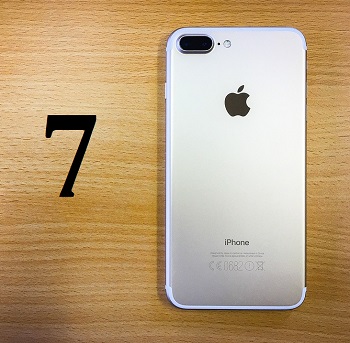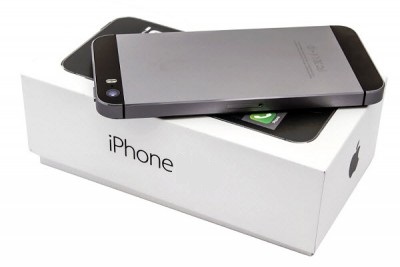Testing has shown that the least expensive version also comes with a considerably slower performance.
Recent tests on the 32GB iPhone 7 are showing that the price you pay for a smartphone can make a difference to performance. The testing by both Unbox Therapy and GSMArena have revealed very similar results.
The 32GB version of the Apple smartphone is considerably slower than its more expensive counterparts.
The two companies both independently found that the 32GB iPhone 7 is much slower than the 128GB and 256GB versions. Furthermore, the 32GB model’s 4G reception is also notably poorer. The testing showed that the speed of the storage within the least expensive iPhone 7 model was a sizeable 200Mbps slower than the more expensive 128GB version.
 The read speed of the two mobile devices was measured at 656Mbps for the 32GB and 856Mbps for the 128GB. That said, it was also pointed out that in terms of day to day usage, any fluctuation in read speed higher than 600Mbps is unlikely to be detected by the user.
The read speed of the two mobile devices was measured at 656Mbps for the 32GB and 856Mbps for the 128GB. That said, it was also pointed out that in terms of day to day usage, any fluctuation in read speed higher than 600Mbps is unlikely to be detected by the user.
What may be noticed by 32GB iPhone 7 users is a difference in writing to the storage.
The write speed was significantly slower on the cheaper model. While the more expensive 128GB iPhone write to memory at 341Mbps, there was an eight times slower write rate on the 32GB model. Its write to memory speed was measured at only 42Mbps in the Unbox Therapy tests.
This was only underscored by the GSMArena tests. The iPhone 7 Plus version write rate was nearly identical. The 32GB smartphone registered a write to memory speed of 39.6Mbps. The 128GB iPhone 7, on the other hand, wrote to memory at 308Mbps.
Other testing of the various Plus versions have shown that there are differences among them in their cellular performance. Cellular Insights, a firm based in New York, tested the networking equipment of the devices. What it found was that models A1778 and A1784 – which were sold in the UK and Europe – achieved considerably poorer performance than the A1660 and A1661 models sold in the United States.
These tests show that it’s not just the 32GB iPhone 7 that differs from the other models. Smartphone performance also depends on where you purchase your device.
The larger size display Apple smartphone broke pre-order sales records during its first 24 hours of availability.
Within the first 24 hours of pre-orders for the iPhone 6 Plus, the Apple smartphone with the new larger display, managed to break records, and is now facing delays of three to four weeks over what had initially been anticipated.
Now the new model of Apple smartphone has also started to run low or even sell out in American stores.
Stores throughout Manhattan, not just the Apple Store, have been reporting that their stocks of the iPhone 6 Plus are rapidly fizzling out. In fact, many of them came to the point that they were sold entirely out of their stock. This was the case that was being experienced in shops across the country that have been selling this new device. In downtown Portland, Oregon, the customers who had been lined up outside the store on the day that the product was to be released were informed that the larger display smartphone was sold out even before it opened.
This is striking news, when taking into consideration that the iPhone 6 Plus isn’t selling as well as its smaller alternative.
 That said, despite the fact that the iPhone 6 is selling more quickly, its delay is notably shorter than the larger option. Therefore, some consumers have decided to go with the smartphone that they are able to obtain more quickly. Some are seeking to find alternative ways to obtain the larger mobile device, but – depending on location – it can feel nearly impossible for those consumers to be able to have those devices in their hand without a considerable wait period.
That said, despite the fact that the iPhone 6 is selling more quickly, its delay is notably shorter than the larger option. Therefore, some consumers have decided to go with the smartphone that they are able to obtain more quickly. Some are seeking to find alternative ways to obtain the larger mobile device, but – depending on location – it can feel nearly impossible for those consumers to be able to have those devices in their hand without a considerable wait period.
According to 451 Research LLC analyst, Carl Howe, in a sales forecast that they have released Apple could may have sold between 12 million and 15 million devices over the weekend. That said, another prediction, from Sanford C. Bernstein and Co. analyst, Toni Sacconaghi, it was stated in a note written to investors that it was likely that there were between 7 million and 8 million devices sold. That would place the total at just shy of the 9 million units sold last year when the iPhone 5S and 5C were released.
The reason that Sacconaghi felt that sales of the iPhone 6 Plus and its smaller counterpart would not sell as much as last year was that Apple is facing serious restrictions in China so that it cannot be included among the countries in which these mobile devices are being sold in their first wave.
 The read speed of the two mobile devices was measured at 656Mbps for the 32GB and 856Mbps for the 128GB. That said, it was also pointed out that in terms of day to day usage, any fluctuation in read speed higher than 600Mbps is unlikely to be detected by the user.
The read speed of the two mobile devices was measured at 656Mbps for the 32GB and 856Mbps for the 128GB. That said, it was also pointed out that in terms of day to day usage, any fluctuation in read speed higher than 600Mbps is unlikely to be detected by the user.
 That said, despite the fact that the iPhone 6 is selling more quickly, its delay is notably shorter than the larger option. Therefore, some consumers have decided to go with the smartphone that they are able to obtain more quickly. Some are seeking to find alternative ways to obtain the larger mobile device, but – depending on location – it can feel nearly impossible for those consumers to be able to have those devices in their hand without a considerable wait period.
That said, despite the fact that the iPhone 6 is selling more quickly, its delay is notably shorter than the larger option. Therefore, some consumers have decided to go with the smartphone that they are able to obtain more quickly. Some are seeking to find alternative ways to obtain the larger mobile device, but – depending on location – it can feel nearly impossible for those consumers to be able to have those devices in their hand without a considerable wait period.